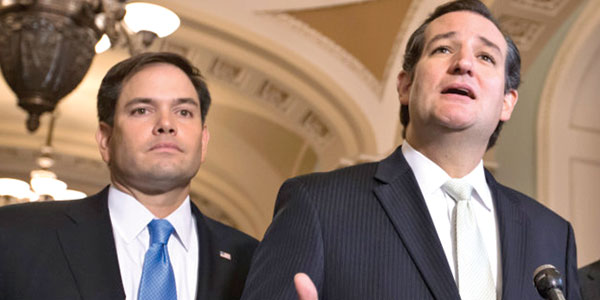
Hay veces en que ya no reconozco a Estados Unidos. El mismo país que se fundó con inmigrantes acaba de escoger como candidato presidencial a un hombre que quiere deportar a 11 millones de inmigrantes en dos años. Esta no parece la misma nación que me recibió tan generosamente hace 33 años y a muchos más después de mí.
¿Cómo explicamos el fenómeno de Donald Trump? Fácilmente. En Estados Unidos hay millones de personas que piensan como él y que comparten sus comentarios racistas en contra de los inmigrantes latinos y en contra de los musulmanes. Nunca había recibido tantos insultos en las redes sociales como ahora (y espero muchos más después de esta columna).
Trump está convirtiendo en normal lo que antes eran comentarios y comportamientos castigados socialmente. Estamos en un extrañísimo paréntesis histórico en Estados Unidos en que se vale expresar en público todos tus prejuicios. Los demonios andan sueltos.
Denigrar a las mujeres públicamente, acusar de violadores a todo un grupo étnico o discriminar contra una religión hubiera descalificado a cualquier aspirante presidencial hace cuatro años. Hoy no. Hoy lo convierte en candidato del partido Republicano.
Por eso hay días en que no reconozco a Estados Unidos. Nunca me había tocado cubrir una campaña como esta. La recordaré, por supuesto, por los exabruptos y los extremismos de Trump. Pero también porque por primera vez en la historia, hubo dos candidatos latinos a la presidencia: los senadores Marco Rubio y Ted Cruz.
Lo peor que hicieron Rubio y Cruz fue tratar de parecerse a Trump. No entiendo todavía por qué dos hijos de inmigrantes decidieron darle la espalda a otros inmigrantes como sus padres. (Los padres de Rubio y el padre de Cruz nacieron en Cuba.) Cruz quería deportar a 11 millones, como Trump. Rubio incomprensiblemente se opuso a un plan de legalización de indocumentados que él mismo como senador había pensado, planeado y propuesto.
Rubio y Cruz rompieron una noble tradición en que los políticos hispanos a nivel nacional, independientemente de su partido, siempre defendían a los más vulnerables, a los indocumentados. Ellos decidieron no hacerlo. Fue muy triste.
Más triste fue verlos pelear en un debate presidencial para ver cuál de los dos tenía la posición más antiinmigrante. Su deseo de ser como Trump — de insultar como Trump y, por supuesto, de ganar como Trump — oscureció las grandes características de liderazgo que los convirtieron en dos de los más jóvenes senadores de Estados Unidos.
También recuerdo con pena ajena cuando Rubio presumió tener dedos más largos que los de Trump o cuando Cruz — el mismo día que lo derrotaron en Indiana y se retiró de la contienda — acusó a Trump de ser un “mentiroso patológico” y perdió la cordura en televisión nacional. Trump los entrampó.
Marco y Ted quisieron ser como Donald respecto a los inmigrantes. Pero, afortunadamente, no hay otro como Trump.
Como todos sabemos, Estados Unidos es un país que tiene un proceso religioso para rescatar a los perdedores. Primero confiesan sus errores en público, luego hacen un acto de contrición, prometen no repetir sus pecados y al final se presentan como si hubieran renacido. Rubio y Cruz tendrán que pasar por este proceso de expiación de culpas. Pero los dos son demasiado talentosos e inteligentes como para retirarse de la política después de una caída, por más estrepitosa que haya sido.
Además, son muy jóvenes y se pueden equivocar muchas veces más… hasta ganar. Rubio tiene 44 años y Cruz 45 (aunque los dos parezcan mayores). De tal manera que se pueden lanzar en el 2020, 2024, 2028, o hasta que lleguen a la Casa Blanca. El tiempo está de su lado.
Y la demografía también. Cada mes más de 60 mil jóvenes hispanos cumplen 18 años — la edad de votar — y en tres décadas seremos más de 100 millones de latinos. Somos un creciente e indiscutible poder electoral.
Muchos latinos — los conozco — hubieran querido estar orgullosos de Rubio y Cruz y elegir al primer Presidente hispano de Estados Unidos. Pero nunca se sintieron a gusto con las posiciones antiinmigrantes de los senadores cubanoamericanos.
La política es brutal. Convirtió a dos hijos de inmigrantes en portavoces de un movimiento que culpó injustamente a los indocumentados de los principales problemas económicos y de seguridad del país.
Lección para la próxima elección: Siempre es mejor ser uno mismo y poder regresar con los tuyos sin bajar la mirada. Marco y Ted pudieron ser los nuevos héroes de la comunidad latina y, en cambio, decidieron parecerse al villano. Así perdieron dos veces.
(Jorge Ramos, periodista ganador del Emmy, es el principal director de noticias de Univisión Network. Ramos, nacido en México, es autor de nueve libros de grandes ventas, el más reciente de los cuales es “A Country for All: An Immigrant Manifesto”.)
____________________________________________________________________________________________________________________
The Fall of Marco Rubio and Ted Cruz
By Jorge Ramos
I hardly recognize America these days. The same country that was built by immigrants is on the verge of handing the Republican presidential nomination to Donald Trump, who wants to deport 11 million immigrants within two years. This doesn’t seem like the same nation that welcomed me over 30 years ago, and so many other immigrants since then.
How to explain the Trump phenomenon? Easily: Tens of thousands of Americans share his racist views of Hispanic immigrants and Muslims. And Trump is normalizing what used to be socially unacceptable behavior. We seem to be entering a strange era in American history where publicly expressing ignorance and prejudice is just fine. And now, the demons are on the loose. I know this partly because I’ve never received so many insults on social media as recently (and I expect to get more after this column is published).
It used to be that any presidential candidate would have been disqualified for denigrating women, labeling an ethnic group as criminals or discriminating against a particular faith. But not today.
This election cycle will be remembered, of course, for Trump’s outbursts and extremism — but also because, for the first time in history, two major Latino candidates were in the running: Marco Rubio and Ted Cruz. They both suffered from what I’ll call the Trump effect: They tried to follow his example too closely.
I’ll never understand how two sons of immigrants decided to turn their backs on other immigrants (Rubio’s mother and father were born in Cuba, as was Cruz’s father). Cruz, a Texas senator, supported the deportation of 11 million immigrants, just like Trump. Rubio, a senator from Florida who once helped plan a path toward legalization for undocumented immigrants, inexplicably turned against it during the campaign. Meanwhile, both Rubio and Cruz broke with a long, noble tradition among Hispanic politicians, no matter their party affiliation: Always defend the most vulnerable population in this country, the undocumented.
During the primary debates, it was sad to watch Cruz and Rubio bicker over who held the most anti-immigrant position. Their desire to insult people and dominate debates like Trump obscured their strong leadership traits. Rubio and Cruz wanted very badly to be just like The Donald, but (thankfully) there’s only one.
Now that their presidential campaigns are over, what’s next for Cruz and Rubio? Losers in American politics often follow a path of atonement in hopes of redeeming themselves and their relevance. First they confess their failings in public, then they do an act of contrition and vow never to commit their sins again. Finally, they return as though they were reborn.
Both Rubio and Cruz will undergo this penance process, since both are too talented and smart to quit politics after just one fall, no matter how deafening it was. And they’re both still young enough — Rubio is 44; Cruz, 45 — to be wrong several more times. They might run in 2020, 2024, 2028 or until they get into the White House — time is on their side. And so are the demographics: Every month, more than 60,000 young Hispanics turn 18, and in three decades’ time, there will be more than 100 million Latinos living in the U.S. — an indisputable electoral force.
However, I know many Hispanics who wish that they could have elected either Rubio or Cruz as the nation’s first Hispanic president this time around. But the Cuban-American senators’ anti-immigration stance was just too much to bear.
Politics is brutal. It can transform the sons of immigrants into spokesmen for a movement that unjustly blames immigrants for economic and security woes. But here’s a lesson for the next election cycle: In the end, it’s always better to be true to yourself and able to look your loved ones directly in the eye. Cruz and Rubio had a chance to be our community’s heroes, but instead they decided they wanted to be like the villain. So they lost. Twice.
(Jorge Ramos, an Emmy Award-winning journalist, is a news anchor on Univision and the host of “America With Jorge Ramos” on Fusion. Originally from Mexico and now based in Florida, Ramos is the author of several best-selling books. His latest is “Take a Stand: Lessons From Rebels.” Email him at jorge.ramos@nytimes.com.)










